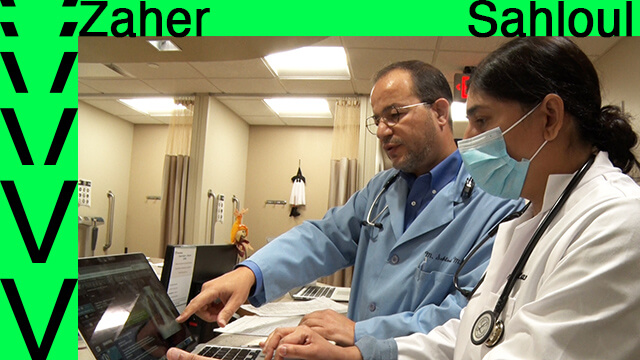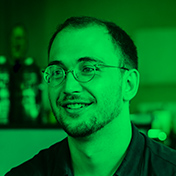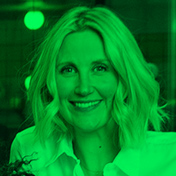
Medical Support for a World in Crisis
Zaher Sahloul / Physician and the President of MedGlobal
Chicago physician Zaher Sahloul founded an NGO to support people enduring war and natural disasters worldwide. It started in response to war in his homeland. Syria, and continues today in Ukraine.
Here's what we talk about in this episode: Global issues, Humanity, Human rights, Illness, International, Medicine, Refugees, Survivors, Treatment
*You will leave the NHK WORLD-JAPAN website
Draft transcript
- Alex Steullet / Host:
- I'm Alex Steullet, and this is Vision Vibes. The podcast that hopes to give you inspiration and tools to live a more satisfying life.
- This story was originally broadcast on television as part of the interview series Direct Talk. If you enjoy listening, you can head to the NHK WORLD website to watch. You'll find interviews with people from all walks of life.
- I've been living away from my home country for the past seven years. Every year over the holidays, I go back home to visit my friends and family. It's always an interesting feeling, to be reminded of the environment I grew up in. I remember the culture I share with those around me. I see myself so clearly reflected in their eyes.
- Today's guest knows that feeling all too well. Zaher Sahloul is a Syrian-American doctor. When war broke out in his home country, he felt a profound sense of obligation. For 11 years, he helped provide medical supplies to the people suffering in Syria.
- The experience of helping victims of war moved Zaher. He decided to expand his operations beyond his home country, to people all around the world. He founded the NGO MedGlobal, and when war broke out in Ukraine, his team was among the first to respond.
- Within a few weeks of the invasion, they were on the ground with suitcases full of medical supplies, helping to organize local medical personnel.
- What does Zaher think about the war in Ukraine, and how does he plan to continue helping people in need? Let's join narrator Hana Barnes and find out on today's episode of Vision Vibes.
- Hana Barnes / Narrator:
- Since February 2022, the Russian invasion of Ukraine has continued with no end in sight.
- The people of Ukraine have endured numerous attacks on their cities. And shortages of medical staff and supplies have increased their suffering.
- Zaher Sahloul, president of the chicago-based nonprofit, MedGlobal, has worked on providing medical support since the beginning of this crisis.
- We ask Zaher Sahloul to tell us the key to helping people in crisis.
- Zaher Sahloul:
- In the areas that are under bombing in the war in the frontlines, you have hospitals that are being attacked or targeted, which is unfortunately something that the Russians have done also in my homeland in Syria.
- So, the hospital struggles to deal with this influx of large number of injured patients. So, people need to be trained and hospital need to modify the way that they operate.
- But what we have done, in MedGlobal, that we've done this mass casualty training. So, we send busy trauma surgeons from busy trauma centers in the United States to provide this type of training. So, that way, doctors, emergency room nurses, administrator understand what they need to do to make sure that they can save as many lives as possible within the setting of war in spite of the limited resources, in spite of the disruption of the supply chain.
- So, one of the training that we have done is called point-of-care ultrasound, which is basically using small devices or ultrasound probes that are connected to the iPad or the smart phone. We coordinate with the Ministry of Health in Ukraine, so they can -- they always tell us this is a list of what we need, and then we try to arrange for that, procure that in the United States, and then send that to our warehouse in Lviv in Ukraine. And sometimes, we send them to Poland.
- And from there in the warehouse, our team will distribute them to the different hospitals that are in need for them on the frontline or based on their needs.
- Hana Barnes / Narrator:
- Sahloul organized a team of 5 medical volunteers to join him on a mission to Ukraine within a few weeks of the invasion.
- They visited field hospitals and medical facilities, delivering supplies and equipment.
- In just 5 days, they were able to set up a local network of doctors and nurses.
- Zaher Sahloul:
- We took with us 167 pieces of luggage. So, when we arrived in Warsaw airport, we had this pile of luggages. So, he had a bus, we had them with us, and then he took us across the border to Lviv in Western Ukraine. We visited several hospitals, and it was very safe at that time, but I mean you feel the war. You feel the war because, you know, at night, there's complete darkness, there's no electricity, there is blackout. You cannot get in the city or outside of the city because of the curfew, and you hear the sirens several times during the day. People are fixated on their phones trying to get the information, and it felt like World War III to me. And this is in Europe. This is in a European City. Lviv is a beautiful city.
- But outside of that, we visited hospitals, we talked with doctors, and we asked them, "How can we help?" They told us that you are the first NGO that arrived in the city. So, we were very happy to hear that.
- And in the way back, we helped in evacuating one family. I still remember the name of the child. His name was Timothy. He was 12 years old, and he was fleeing from Kyiv -- from a city near Kyiv with his family. The Russians opened fire on the car and his mom -- his grandma bled to death in the field. There were no ambulances to take care of her and she died. His cat also died. He had fractures, his aunt had fracture, his grandpa had fractures, and we took them to local hospitals in Poland in Lublin.
- And he was completely traumatized, similar to the children I've seen in Syria. I mean nothing different. You know when you are traumatized, you are traumatized, and especially in the faces of children, it shows. And he told me to tell the story. So, these things stays with you when you go to a place that are going to disaster. And I think these children keep bringing me back, their -- the picture and the images of their faces, whether they are in Syria or Gaza or in Yemen or in Ukraine to these places.
- This is not something that you're trained in medical school or training, but you are using different parts of your brain. I think it's the importance of pushing the envelope, the importance of taking risk. Without taking risk in life, you're not going to go anywhere. And the importance of, you know, networking, getting to know people who you don't know whether they will help you or not, and how to trust this person. You have to talk to the person and then understand -- and look at the eye to them.
- It takes me two to three weeks to get back to my balance after I come from medical missions because all of these things that you have seen, I have seen, the stories, and things like that, it adds up and affects my mental health like anyone else.
- Hana Barnes / Narrator:
- Sahloul was born in Syria, where he graduated from medical school. In 1989 he left for the US to pursue his studies further.
- At hospitals in Chicago he built a successful career working as a critical care and pulmonary physician.
- But when Syria descended into the turmoil of civil war, he decided to rush back to his homeland with medical supplies.
- He didn't know what to expect.
- Zaher Sahloul:
- So, from the time that you get across the border using smugglers. This is something that I've never been trained to do that no one is, but it's of course risky business but you have to do it. I felt that I had to do it.
- Basically we had the Turkish guard shooting at us. We had them putting us like in the back of the van and then sending back -- sending us back to Syria because they thought that we are smugglers not physicians. So, how do you help the population now with that don't have functioning government and don't have functioning hospitals?
- Um, how to establish a field hospital in a mountain or in a cave? One of the hospitals that we established was in the middle of cave because hospitals were bombed routinely by the Assad regime. Doctors were killed and targeted. So, all of these things were difficult. But, you know, I think retrospectively, I think that's the most important thing that I did in my life.
- In Syria, after 11 years of war, you have limited resources that affects every part of Syria. That's why we're seeing an outbreak of cholera. It reflects basically this -- it's a symptom of much bigger problem.
- Cholera is related to the fact that you don't have clean water anymore. You don't have enough electricity to provide clean water. You don't have enough chlorine, that you don't have enough education for people to know that they cannot drink from the river. But this is the tip of the iceberg. I think the situation, medical situation is much more horrible, but we don't see it in the news. It's not bombs and missiles that are killing people. It's normal diseases.
- Hana Barnes / Narrator:
- Sahloul founded MedGlobal in 2017 to help people in crisis across the world with his medical expertise.
- MedGlobal has provided medical services to about 750,000 people with the help of more than 500 volunteers.
- In 2022, they delivered more than $6.5 million worth of medical equipment and supplies. All these missions and supplies are funded by donations.
- Zaher Sahloul:
- The world, unfortunately, is full of disasters and it will get worse because of climate change, because of the wars and limited resources and water shortage and all kinds of stuff, pandemics, COVID pandemic.
- We select the countries that we think that we can have an impact, and that we think that we have an access. Um, and the way that we do it, that initially we start with assessment, and then if the disaster will last for long time, then we hire people from the same country and we establish sustainable program. Because the idea is to build resilience in the local community to weather the storm.
- We don't parachute in and parachute out. This is actually not helpful. You want to train -- partner with local communities, train them, provide them with medical equipment and medical supplies so they can do things themselves. They can come up with a solution that are better than the solutions that we come out. And this is why that's the kind of our modus operandi with MedGlobal, partnering with local community, providing them with innovations, with technology, with training that make them more capable to weather the storm, whether it's natural disaster or war situation.
- Um, some days you wake up and you don't want to leave your bed. I don't want to leave my bed because there's too many things you want to worry -- you are worried about. And sometimes, I feel that I can move mountains.
- I'm a different person now than 11 years ago. But I have to continue and, you know, I find ways to take care of myself and my mental health and keep going.
- Hana Barnes / Narrator:
- Sahloul frequently communicates with MedGlobal's local team in Ukraine, to keep up with the needs of medical staff.
- Voice of person on Zoom:
- "And then ultrasound. So, you just keep on going and providing more and more help."
- Zaher Sahloul:
- "Okay"
- Voice of person on Zoom:
- "And last week, we had to make 3 ultrasound devices."
- Hana Barnes / Narrator:
- For Sahloul, the Ukrainian crisis is looking more and more like Syria, and he worries about the possible deployment of chemical weapons.
- Zaher Sahloul:
- I can draw a straight line from the Syrian crisis to the Ukrainian crisis, and many people can do that, can connect the dots that because we allowed Russia to do what they have done in Syria -- and they admitted themselves.
- There's all kind of things that can be used unfortunately in the war, and this next phase of the war could be more brutal. So, civilians may be targeted more, prohibited weapons, whether it's nuclear or biological or chemical weapons may be used by the Russians. So, we have to be prepared, and doctors and nurses have to be prepared,
- They asked us to do training in chemical weapons from the first meeting. Chemical agents in Syria did not kill large number of people, maybe 10,000 people maximum, but it created a lot of scare and depopulated areas, and that was the reason for using it anyway in Syria to scare people and to depopulate area, so people will flee and then it will be easy for the other side to control these area. And I'm afraid that this will happen at one point in Ukraine. They will need the things for the long term. There's something called war fatigue and we've seen it in Syria, where after the first few years of the war, people did not pay attention and stopped paying attention even though that situation now is much worse than five years ago.
- What I'm afraid of, and I think we started to see that, that you will have fatigue -- war fatigue in Ukraine and people will stop paying attention. That mean you will have less aid going to Ukraine.
- Humanize these people who are looked at as numbers only, millions of this and millions of that. You know, give them names, give them age, give details about their life when you talk about them in the media, I think that will make a change. Like-minded people can support organizations that are doing good work. So, donations of course, is also always good. Advocacy now is much easier using the social media.
- Hana Barnes / Narrator:
- After 11 years of working on emergency medical support around the world, what words does Zaher Sahloul keep in mind to further his mission?
- Zaher Sahloul:
- "Children, refugee, risk, and persistence." So, children, because of the children that I've seen in my medical missions, I keep going back.
- Refugee. This is the worst refugee crisis in our lifetime. 25 million refugees, 80 million displaced people. We have to do something. Refugee camps are not good place to live.
- Risk. Unless we take risk, we're not going to do anything meaningful in life. So, taking risk is good. Taking risk in leadership, taking risk will help many people.
- And persistence. We have a saying in Arabic that the rain drops will create an impact in the hardest stone. So, with persistence, we can do a lot, we can help other people and we can change minds. And we can change the mindsets of politicians, who can make major policy changes that will help many people.
- Alex Steullet / Host:
- Children, refugee, risk, persistence. For his parting words, rather than choosing an inspiring quote or phrase, Zaher picked four ideas. The ideas that move him to continue working for the good of humanity.
- If you're like me, living a safe and comfortable life in a stable environment, it can be difficult to imagine what drives people like Zaher. He was already doing good. He was already a doctor. Yet still, he felt the urge to do more.
- It's a phenomenon we've seen again and again on this podcast: People who have improved their own lives, overcome hardship and become successful, will then go back and help others do better.
- Zaher recognizes that we live in troubled times. As he mentioned, children around the world are caught up in war and conflict. We're experiencing the worst refugee crisis in our lifetime. Risk and persistence might just be the only way to avoid World War III. The only way to give the children of Ukraine and other war-torn countries hope for a brighter future.
- His courage is a question to the rest of us. Are we doing enough? Taking enough risks? Or could we do a little more? The answer will be different for each of us, but for me, I suppose I could.
- That's it for today's episode. Thank you for listening. You can find the transcript, as well as our other stories, on the NHK WORLD website. I've been Alex Steullet, join us next time for more mind-expanding insights from inspiring people on Vision Vibes.
- Released on February 16, 2023
- Available until December 14, 2025
Hosts

Alex Steullet
Alex is a Swiss writer, content creator and brand communication specialist. He was born in the USSR, grew up in the United States and Switzerland, and obtained his Master's degree in human rights law in the UK. Alex started his career at the Swiss Federal Department of Foreign Affairs, where he worked for three years on humanitarian and human rights issues. In 2016, he moved to Japan. Nowadays when he isn't writing or traveling, Alex can usually be found singing his heart out at karaoke.

Chloe Potter
Chloe Potter is a broadcast journalist from London. Before moving to Tokyo in February 2020 she ran her own video production company, making content for Google, Sky, the BBC and Bloomberg. Prior to that she was a presenter for Sky News and Sky Arts. She regularly records voice overs and works as a correspondent for a British broadcaster and as a freelance presenter. She has 3 children, loves wild swimming and is an avid podcast fan.
